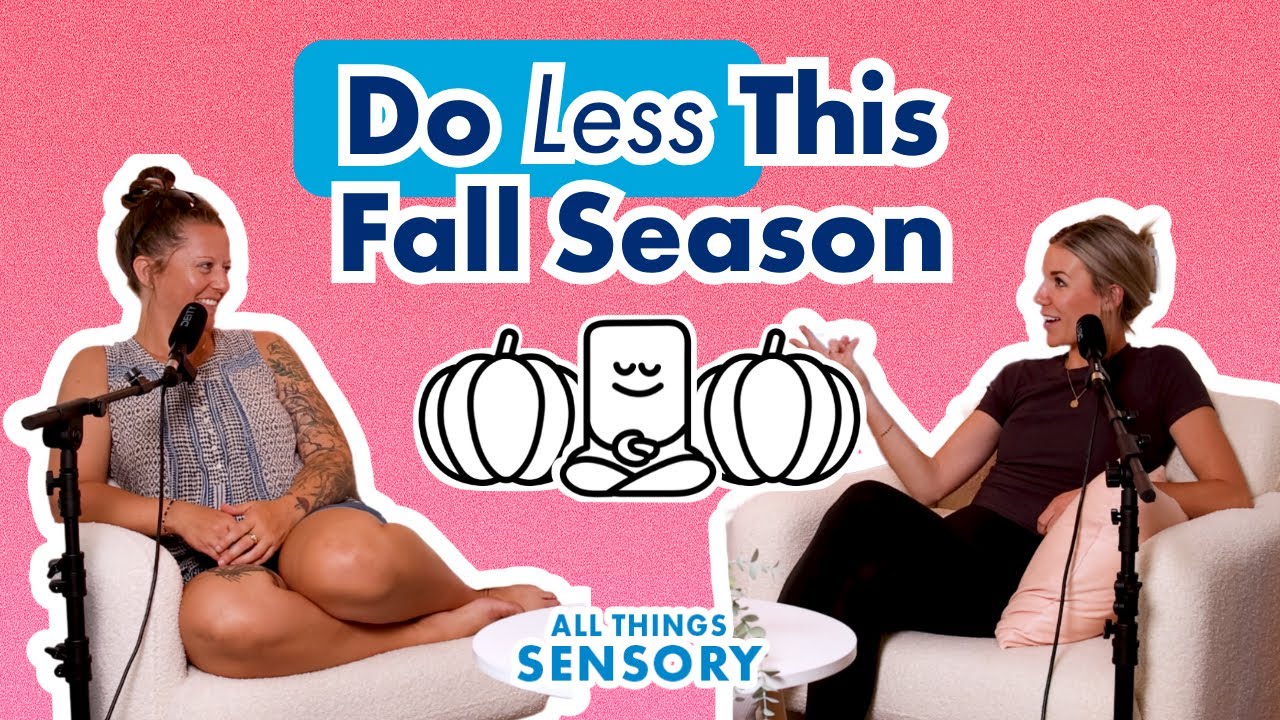Your Cart is Empty

The transition from fall into the holiday season can feel overwhelming for both parents and sensory kids. Between weather changes, shorter days, holiday stress, and immune system struggles, it’s no wonder regulation gets harder this time of year.
In this episode, you’ll learn:
Why meltdowns and anxiety increase in fall and winter
How weather, daylight, and school routines affect regulation
The impact of rigid thinking with clothing changes
Simple strategies to reduce stress and support sensory kids
Immune-boosting ideas and cozy after-school routines that actually help
Thanks for listening 🩷
Share this episode with a parent or teacher who could use some fall regulation tips!
We’d love to answer your questions on the podcast! Fill out this form - https://harkla.typeform.com/to/ItWxQNP3
All Things Sensory Podcast Instagram
As the leaves change and the air cools, many families welcome the cozy routines of fall. But for children with sensory processing challenges, this season can bring unexpected dysregulation, emotional overload, and exhaustion.
If you've noticed more meltdowns, rigid behavior, or general unease in your child or clients during the fall, you're not alone. Let’sl explore why fall is a uniquely difficult time for sensory kids and share actionable, therapist-approved strategies to help ease the transition into cooler months.
Weather shifts: Cooler temperatures, wind, rain, and early sunsets affect how the nervous system processes the environment.
Less outdoor time: Shorter days and lower temperatures reduce time spent outside, limiting movement and natural sensory input.
Increased screen time: With less time outdoors, kids often spend more time on screens, which can dysregulate sensitive systems.
Immune system challenges: Many sensory kids are already immunocompromised due to retained reflexes, dietary issues, or sensory-based challenges.
Sensory Avoiders may feel overwhelmed by bulky fall clothing, cold air, or unexpected textures.
Sensory Seekers may struggle with the lack of movement and increased indoor time.
Emotional sensitivity rises due to less sunlight, disrupted routines, and more social obligations.
Longer, more intense meltdowns.
Sleep disturbances or bedtime resistance.
Refusal to wear seasonally appropriate clothing.
Regression in therapy or school routines.
More emotional outbursts or rigid thinking.
Heightened anxiety, especially around upcoming holidays.
Reminder: These are not behavioral "problems." They are nervous system responses.
Fall often comes with its own invisible to-do list: pumpkin patches, halloween costumes, holiday prep, school conferences, and social media comparison. These pressures affect adults, and our kids pick up on that stress.
Children with sensory needs often mirror our emotional states. If you feel anxious or overloaded, your child likely will too.
Let go of the Pinterest-perfect fall.
Choose a few meaningful traditions and skip the rest.
Create your own rhythm that works for your child’s sensory profile.
Crawl: Crawling after school helps reset the vestibular and proprioceptive systems.
Bubble Mountain: Fill a bowl with soapy water and blow bubbles with a straw. It builds deep breathing and oral motor strength.
Obstacle courses: Use couch cushions or crash pads to create simple indoor movement circuits.
Cozy corners: Set up a safe, inviting space with soft lighting, weighted items, and calming tools.
Go outside every morning and evening to reset sleep hormones.
Use lamps or red light in the evening to reduce exposure to bright artificial light.
Talk with your pediatrician about vitamin D, C, and zinc supplementation.
Gradually introduce fall clothing before it's urgently needed.
Offer choices to increase autonomy.
Use social stories or visuals to support flexibility.
Expect setbacks and prepare your home routine to restart gently.
Use sick days for low-key sensory play like lotion massage, warm baths, or dim-lit puzzle time.
The shift into fall can feel chaotic, but with small changes, it can become a cozy, connective season. Children with sensory challenges need extra support to manage their environments, their emotions, and their routines—and so do their parents and therapists.
By focusing on what matters most—regulation, connection, and realistic expectations—we can make fall not just manageable, but meaningful.
BORING, BUT NECESSARY LEGAL DISCLAIMERS
While we make every effort to share correct information, we are still learning. We will double check all of our facts but realize that medicine is a constantly changing science & art. One doctor / therapist may have a different way of doing things from another. We are simply presenting our views & opinions on how to address common sensory challenges, health related difficulties & what we have found to be beneficial that will be as evidenced based as possible. By listening to this podcast, you agree not to use this podcast as medical advice to treat any medical condition in either yourself or your children. Consult your child’s pediatrician/ therapist for any medical issues that he or she may be having. This entire disclaimer also applies to any guests or contributors to the podcast. Under no circumstances shall Rachel Harrington, Harkla, Jessica Hill, or any guests or contributors to the podcast, as well as any employees, associates, or affiliates of Harkla, be responsible for damages arising from use of the podcast.
Keep in mind that we may receive commissions when you click our links & make purchases. However, this does not impact our reviews & comparisons. We try our best to keep things fair & balanced, in order to help you make the best choice for you.
This podcast should not be used in any legal capacity whatsoever, including but not limited to establishing “standard of care” in a legal sense or as a basis for expert witness testimony. No guarantee is given regarding the accuracy of any statements or opinions made on the podcast.
Comments will be approved before showing up.